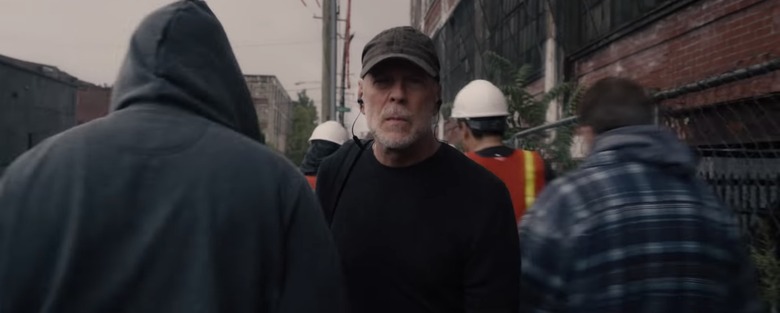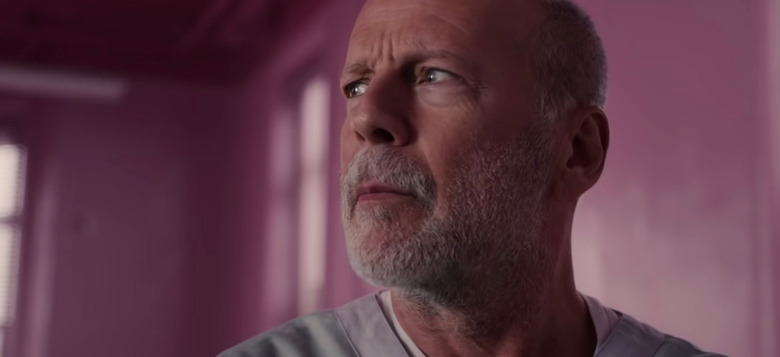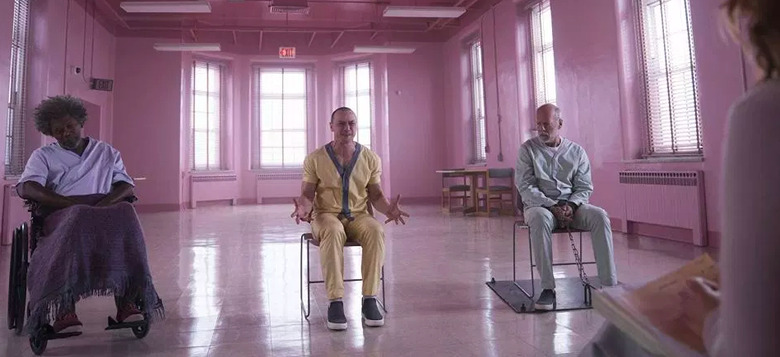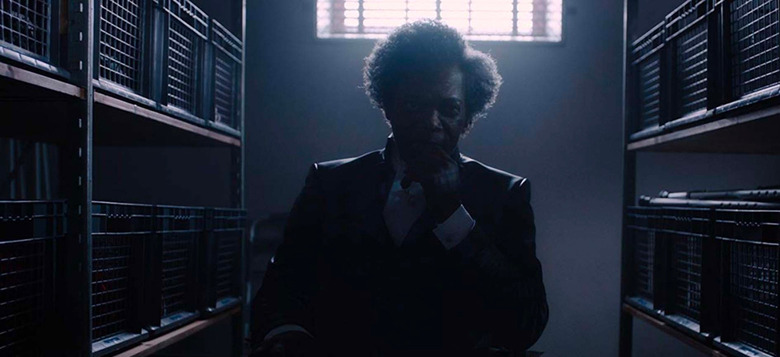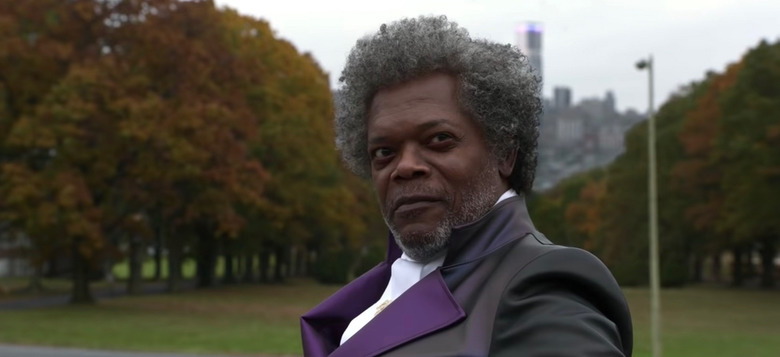'Glass' Spoiler Review: Breaking Down M. Night Shyamalan's Disastrous Sequel To 'Unbreakable' And 'Split'
"Please enjoy this film that took 19 years to make!"
This sentence greeted me as I sat down at a pre-release screening of Glass last week, as the final part of a letter from its writer/producer/director M. Night Shyamalan to the audience. The upshot of the letter was basically, "Please don't spoil Glass" (which I'm about to do, so...sorry!) but I could not help but latch onto that last sentence as I steeled myself for the crossover between two of Shyamalan's earlier films, Unbreakable and Split. As a fan of the former film, a meditation on loneliness as filtered through a comic-book lens, I was hopeful that this follow-up was worth the wait.
Now that I've seen Glass, I fear that it would've taken the director at least another 19 years to make this movie any good.
Bringing Two Worlds Together
First, a little context for the curious: I am not the biggest defender of every M. Night Shyamalan film. Now that he's made 13 films (and I've seen all of them), I'd argue that he's made just five good ones, including both Unbreakable and Split. If it wasn't for the abrupt ending of Unbreakable — with closing title cards telling us what happened to David Dunn (Bruce Willis) and Elijah Price (Samuel L. Jackson) after David learns that Elijah deliberately caused several disasters in Philadelphia, killing hundreds of people specifically so he could find a person with superpowers — it would be my favorite of Shyamalan's films. Split is a lot more ridiculous, and you could make a very solid argument that its commentary on the long-term effects of sexual abuse is real problematic. But James McAvoy's performance is charmingly over-the-top, and Anya Taylor-Joy matches him in her own distinct way.
So I wanted to like Glass. And it starts somewhat strongly, as we see Kevin Wendell Crumb (McAvoy) back to his old tricks: he's kidnapped four helpless young women, all cheerleaders, and has them locked up in an abandoned red-brick factory somewhere in Philadelphia. Unbeknownst to Kevin (and the other twentysomething personalities housed in his mind), he's on a collision course with the hero of Unbreakable, an older, more grizzled-looking David Dunn. 19 years later, David is a widower who runs his own home-security store with his adult son Joseph (Spencer Treat Clark), but his secret identity is that of The Overseer, a vigilante avenging all types of crimes. (The first time we see him in his dark poncho, he's taking out two schmucks who are "Superman-punching" random people on the street.)
Joseph still idolizes his dad, whose true aim is to take down the Horde (the nickname given to Kevin by the media), but the younger man is concerned his dad's, basically, getting too old for this shit. (The two of them have a tetchy back-and-forth during which we get a cameo from Shyamalan himself. Remember when he played the drug dealer at the stadium in Unbreakable? And had, like, one line of dialogue? Sure you do! You'll definitely appreciate this movie calling back to that cameo.) Joseph, it turns out, is right to be concerned: when David goes on a walk around town, he walks by Kevin, realizes he's facing down the Horde, after which they get into a fight stopped only by a slew of cops and a friendly-sounding psychiatrist.
A Hero And Villain Go Head-to-Head
The fight scene, before it's unexpectedly stopped, would be more enjoyable if it didn't showcase an unavoidable problem: Bruce Willis. Two of this A-lister's best performances are in Shyamalan films, and there's even more recent evidence that Willis can work with unique directors in great films. (Remember Moonrise Kingdom and Looper?) Returning to play David Dunn might suggest a return to form, but here's the thing: Bruce Willis is not in a lot of this movie, and when he is, he's barely engaged. The action sequences, including this first-act battle, seem designed to hide Willis' face so his stunt double can perform hand-to-hand combat. What should be an exciting tete-a-tete doesn't work because only McAvoy (who's appropriately muscly) is the only one who seems like he's invested in the proceedings.
As mentioned, those proceedings come to an unexpected end after David frees himself from Kevin/The Beast's bear-hug grip. Once he drags them both out a window, outside the factory, they're both shocked to see a lot of cops in riot gear and Dr. Ellie Staple (Sarah Paulson) who has some flashing-light technology that can physically force Kevin's personalities to change in an instant. Before you can wonder how it is that Dr. Staple and the cops knew where to find Dunn and the Beast, she immediately remands the two of them to Raven Hill Memorial Hospital for further diagnosis. Once there, she reveals separately to them that her specialty is in focusing on people who think they're superheroes, and breaking down those delusions.
And that, in effect, is the next hour of the movie.
Marking Time in The Hospital
Up to this point, I was kind of on board with Glass. It's important to note here that this is much more of a sequel to Split; when I saw McAvoy billed above both Willis and Jackson, I was surprised, but it makes sense. He's the main character again, and the only one who truly begins to doubt his own superpowers. But here's the rub, and it's something Chris Evangelista hit upon in his review at /Film: I know these characters have superpowers. I've seen Unbreakable. I've seen Split. There is no debate here: David Dunn and Kevin Wendell Crumb, within the context of this universe, have superpowers. Unbreakable, specifically, is about David Dunn accepting his identity. Split is about a character whose personalities are just waiting for him to embrace his own. The opening of Glass suggests that both men accept who they really are. So why do we need to watch another movie with these characters doing the exact same thing?
At this point, if you haven't yet seen Glass (and trust me, you're doing it right), you may wonder why I haven't brought up Elijah Price yet. Of all the baffling, faux-daring things M. Night Shyamalan does in Glass, the top of the list is that a) Samuel L. Jackson does not appear in the first 30 minutes, and b) he does not say a single word for (and I checked my watch to verify this) the first 70 minutes. Elijah, as you may remember, wound up in a mental institution, and wouldn't you know, it's Raven Hill. He is, however, apparently sedated to the point where he's been rendered mute. Dr. Staple wants to perform some procedure on Elijah, but aside from being mocked by the only two orderlies on duty (this hospital is woefully understaffed), nothing much seems to happen to Elijah these days. "Nothing much", by the way, is the way I would describe the moment when David first encounters Elijah, after presumably 19 years. You might think that he'd be a little more shocked than just saying, a bit disdainfully, "This guy?" You would be wrong.
Of course, it's revealed—more than an hour into the 130-minute movie—that Elijah is awake and very alert. Late one night, he first explores Kevin's case file and is shocked by what he sees. (We'll get to that.) Soon, he introduces himself to Kevin, in the hopes of meeting the Beast and determining whether he's in the presence of another superpowered individual. They agree to work together, or as Elijah puts it "That sounds like the bad guys teaming up," to prove that superpowers are real. That requires a fight between David and Kevin in a public place; specifically, the soon-to-open skyscraper Osaka Tower. (When we first learn of the Osaka Tower, it's via a magazine cover that dubs it a "true marvel". Get it? Because, you see, Marvel is a famous comic-book company. As insightful a reference as "That sounds like the bad guys teaming up.")
So Elijah breaks himself and Kevin out — they each get to murder an orderly in gruesome fashion — and he encourages David to do the same. In the same way that Kevin was held back by Dr. Staple's flashing-light technology, David's room was fitted with high-pressure hoses meant to drown him if he fought back. (Keep in mind that Dr. Staple thinks David's water phobia is solely in his mind, and that he...doesn't have superpowers, so why would there be high-pressure hoses in his room?) But Elijah turns off the hoses, so David only has to break down a door, which will re-prove to David that he's super-strong. Elijah tells David to meet them at the Osaka Tower, or else Elijah will blow up the building by using its own chemical-testing facility against it. (The Osaka Tower apparently has a chemical-testing facility.) David gets his poncho, and he faces off with Kevin...
...In the parking lot.
A Misguided Climax
Yes, you see, Elijah and Kevin can't escape from the authorities to get to the Red Herring Tower; instead, they're confined to the parking lot of Raven Hill, as is David. So finally, after about 90 minutes, David and Kevin fight each other again, slamming each other into vans and cars and everything else you might find...in a parking lot. After they each get a series of digs in at each other, the Beast is about to attack David from behind, before someone leaps to his defense with shocking news.
I will note here that Casey (Taylor-Joy) from Split returns here, first informed that Kevin has been caught and then used to help reason with him. (It remains generally icky that Casey comes to Kevin's aid, even after he killed and ate people in front of her.) Casey, Joseph and Elijah Price's mother (Charlayne Woodard) are coincidentally at the hospital when this fight goes down. Joseph, in particular, has done research on Kevin, both by Googling and visiting a comic-book store (which helpfully breaks down its comics by "Heroes" and "Villains", because why not). In doing so, he's found the same shocking thing out about Kevin that Elijah did. Ready? Here goes:
Kevin Wendell Crumb's father was on a train that crashed 19 years ago. The same train crash that David Dunn survived. So, Elijah Price killed Kevin Wendell Crumb's father, and put Kevin on the path that turned him into the Horde. Elijah tries to puff this up into something grandiose, acknowledging that he created both a superhero and a supervillain. He then dubs himself a "mastermind," as if that would be his own villainous title, but it's one he can't enjoy for too long. Because the Beast gets revenge for Kevin, mortally wounding Elijah. As Elijah begins to succumb to his wounds, Kevin and David get back to fighting for a bit, with Kevin tossing David into the large vat of water that was used to suppress the Overseer in his holding cell.
Though David breaks the vat from the inside he struggles to fight off the water trapped in his lungs. That's when the next surprise arrives. Casey again tries to break through to the real Kevin (by saying his name like he's Rumpelstiltskin), but he's shot by a Philadelphia PD sniper...with a mysterious three-leaf clover tattoo on his wrist. As we're all reeling from that shock, we see David coughing his way out of the water, until another cop roughly grabs him and drags him to...a puddle! He starts to drown David, until Dr. Staple offers her hand to David. That's when David learns that Dr. Staple is part of a secret cabal that strives to suppress all proof and existence of superpowered humans (hence the three-leaf clover tattoo), and she lets her fellow cabal member drown and kill David.
I'm describing everything that happened to you, to emphasize how exceedingly, profoundly boring it all felt to experience. M. Night Shyamalan, working with cinematographer Michael Gioulakis, remains a very good visual stylist. A lot of shots in this movie are well-crafted, depicting action in a way you don't often see. He's a good director. But his writing here is sometimes jaw-droppingly atrocious. Or maybe there's another problem. As I watched David Dunn die by drowning in a puddle, I asked myself, "Does M. Night Shyamalan hate that people wanted another Unbreakable movie? Does he hate comic books? Does he just not know anything about comic books?"
A Lack of Pop-Culture Knowledge
The way that Shyamalan talks about comic books in Glass genuinely makes me wonder if he's seen a comic-book movie in the last two decades. Aside from brief references to Batman and Superman, there's no acknowledgment or awareness of the fact that, in the last 19 years, comic books have become mainstream. When Elijah's mother explains to Casey that in some comic books, the good guys and the bad guys have a big fight called a "showdown", it's difficult to know if M. Night Shyamalan thinks the audience doesn't know about comic-book battles, or if he just doesn't care. When Elijah, in the middle of the climactic fight, sees Casey, Joseph, and Mrs. Price, his comment is "Ah, the collection of main characters." It's groan-inducing, as much as Dr. Staple telling Elijah, "I look forward to getting to know your perspicacious mind."
Dr. Staple is perhaps the most thankless part of all. I don't need to tell you that Sarah Paulson is an excellent actress, but if this is your introduction to her work, don't let it be the end. She's quite good in other movies and TV shows, even as she's saddled with buckets of expository dialogue in this role. That something mysterious is going on with Dr. Staple seems evident from the get-go; her knowledge of all three men is far greater than most psychiatrists could ever possibly know. But when we learn she's part of some cabal trying to hide superpowers, it managed to make a modicum of sense while also being a thud of a revelation.
It also technically makes sense where Glass goes in its final moments. Dr. Staple informs members of the secret cabal—who, I should note, meet up in very fancy restaurants in the middle of the day, which doesn't seem smart—that everything went well, and she'll move onto the next city soon. But before she leaves, Dr. Staple stops by a comic-book store, where she overhears two kids talking about a villainous mastermind, who's so smart that he keeps his true plan hidden from everyone. And then, Dr. Staple remembers all the security cameras she placed outside the institution. She soon realizes that Elijah, who took the long way out of the hospital to get to the parking lot with Kevin, did so intentionally: he live-streamed the event to a private website. After his death, Casey, Mrs. Price, and Joseph all receive the same live-streamed video, encouraging them to post it for all to see in the hopes that regular people will watch and realize their own superpowered potential. It's a shrug of an ending to a shrug of a movie.
The biggest sin Glass commits is being dull. McAvoy and Jackson are giving their all here, so it's not a problem of the performances. It's a problem of the writing. What Unbreakable and Split both suggested was that there could be a series of films with superpowered individuals that was inspired by comic books without following the same tropes. What Glass suggests is that M. Night Shyamalan simply wanted to dissect superheroes without any level of awareness about what makes them exciting. It's a hollow, turgid, sluggish film that heavily implies that Shyamalan's last two films, Split and The Visit, were enjoyable flukes after a decade of rough filmmaking.

